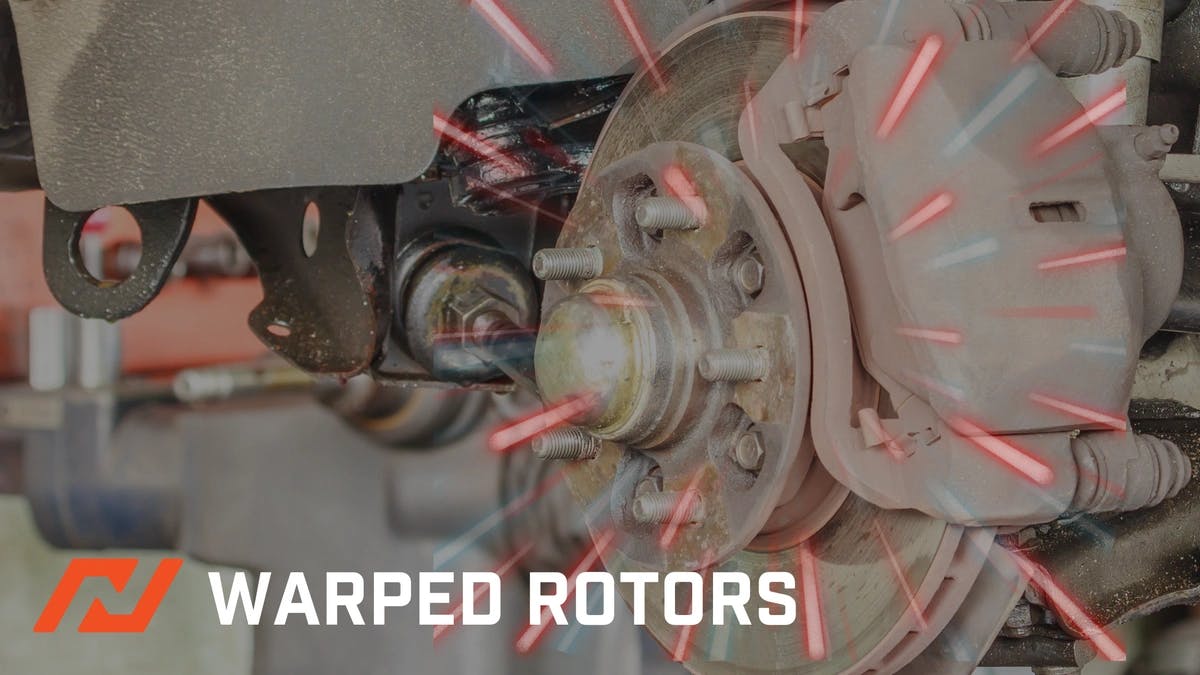What Are Warped Rotors?
Warped rotors refer to the surface of brake rotors, not the metal itself. They're not structurally distorted or bent but have lost their smooth surface for various reasons.
When the surface of the rotor is no longer smooth, it impacts how effectively your brake pads can grip the rotors, leading to less efficient braking. It can also cause vibrations that you might feel in the steering wheel or brake pedal when you apply the brakes.
Key Takeaways:
|
What causes Rotors to Warp?
Warped brake rotors are a common issue among vehicle owners, leading to reduced braking performance and an unsettling vibration when applying the brakes. Understanding the causes behind rotor warping is crucial to preventing this problem from occurring.
Excessive Heat Buildup
Friction from braking generates heat. This is normal, but it can lead to rotor warping when it isn't effectively dissipated or becomes too extreme.
Aggressive Driving Habits
Frequent hard braking or continually resting your foot on the brake pedal while driving generates excessive heat that can warp rotors.
Improperly installed or inadequately torqued rotors can lead to uneven pressure during braking, causing hot spots on the rotor surface that can deform and warp the rotor.
Aging or Worn-Out Brake System
As brakes age, their heat dissipation capabilities can degrade, which might lead to easier rotor warping.
Poor Quality Brake Components
Lower-quality rotors or brake pads can be more susceptible to warping due to their material composition.
How to Fix Warped Rotors in Your Vehicle?
Fixing warped rotors involves several crucial steps and thoroughly understanding the vehicle's braking system.
-
Diagnose the Problem
Detect signs of warped rotors, such as pulsation or vibration in your steering wheel or brake pedal, uneven wear on brake pads, or unusual squeaking or squealing noises when braking.
-
Remove Brake Components
Begin by loosening and removing lug nuts, lifting your vehicle safely using a jack, and securing it with jack stands. Remove the wheels for access to the brake system. Detach the caliper from its mounting bracket by removing its bolts. Hang the caliper carefully to avoid damage to the brake hose.
-
Inspect the Rotor
Check both sides of the rotor for excessive wear or damage. If there's none, you can proceed with resurfacing the rotor. If significant damage is present, consider a replacement.
-
Resurface or Replace the Rotor
Depending on the condition of the rotor, either resurface it using a machining process or hand sanding. Follow the manufacturer's specifications regarding rotor thickness and runout tolerances. If the rotor cannot be safely resurfaced, replace it.
-
Clean and Inspect Other Brake Components
Thoroughly clean all brake parts with a suitable solvent and lint-free cloth. Check brake pads and hardware for signs of excessive wear or damage and replace if necessary.
-
Reassemble the Brake Components
Carefully put all parts back onto the vehicle. Ensure to follow the manufacturer's torque specifications during reassembly.
-
Test the Repair
Finally, test the repair by driving the vehicle in a safe and controlled environment. Check for any noises, vibrations, or other irregularities when applying brakes.
If you're not confident about performing these steps yourself, it's always best to get a professional mechanic or a trusted auto repair service involved.
How do I prevent warped rotors from occurring?
To keep your rotors from warping, follow these practices:
Regular Inspections
Regularly check brake pads, rotors, and calipers for any signs of wear or damage. Catching potential issues early can prevent warping.
Bedding-in Brake Pads
When installing new brake pads, follow the manufacturer's instructions on bedding-in. This process helps ensure even contact between the brake pad and rotor, preventing vibrations.
Avoid Excessive Heat
Try not to use heavy braking for extended periods, or ride the brakes. Both can generate too much heat and increase the risk of rotor warping.
Practice Gentle Braking
Instead of hard braking, try to brake gently, gradually applying pressure on the pedal while maintaining a safe distance from other vehicles.
Don't Ride the Brake
Avoid resting your foot on the brake pedal when not in use, as this can cause brake drag and heat up the system.
Regular Maintenance
Regular brake system maintenance, including checking and maintaining fluid levels, can help prevent rotor warping. Brake fluid is essential in managing the heat generated during braking, so ensure it's in good condition.
By following these measures, you can lower the risk of having warped rotors. However, if you feel vibrations when braking, get your car checked out by a professional right away to avoid further damage to your braking system.
Final Thoughts
Understanding, addressing, and preventing rotor warping is essential to maintain your vehicle's safety and performance. Warped rotors not only diminish the effectiveness of your brakes but also compromise the overall driving experience due to vibrations and unusual noises.
By adopting the recommended practices—regular inspections, correct brake pads, bedding-in process, avoiding excessive heat, practicing gentle braking, and maintaining a well-serviced braking system—you can significantly minimize the occurrence of warped rotors. However, if rotor warping occurs, it's crucial to seek professional assistance to resurface or replace the rotors as necessary.
Remember, continuous care and proactive actions can save you from dealing with potential safety hazards and costly repairs in the long run.
At NuBrakes Mobile Brake Repair, we're committed to helping you ensure your braking system's best performance and safety. If you're experiencing any issues with your brakes or suspect that you have warped rotors, we're here to help.
We offer comprehensive brake inspections to accurately diagnose your brake problems and provide the best solutions tailored to your vehicle's needs. Be sure to schedule your brake inspection with us today!

